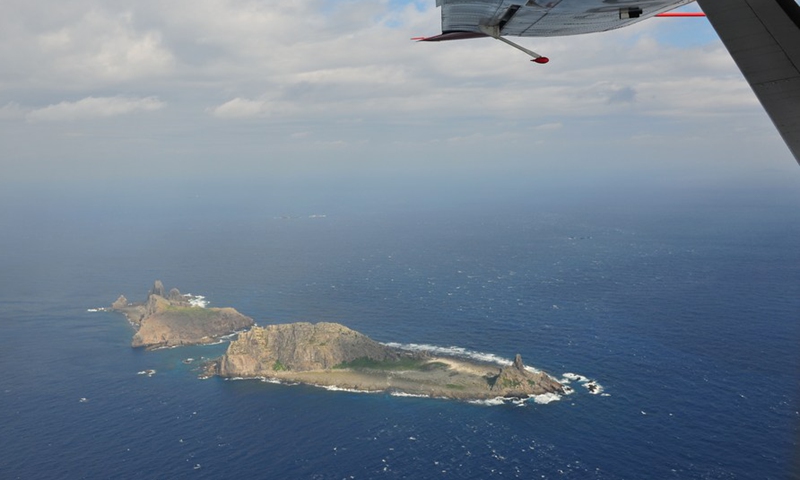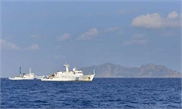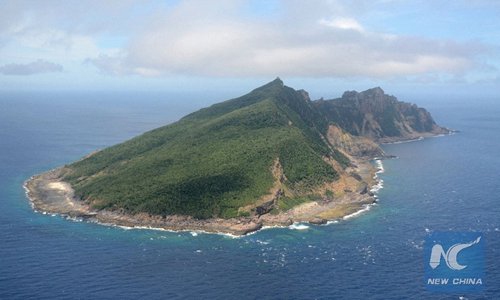Japan warned not to provoke China as media hypes up possibility of conflict in Diaoyu Islands after Galwan Valley clash

File photo taken on a marine surveillance plane B-3837 shows the Diaoyu Islands and nearby islands.Photo:Xinhua
While Chinese people mourn the four martyrs killed in the June 2020 border conflict with Indian troops at Galwan Valley, Japanese media made a "wild and groundless" guess that a similar conflict is very likely to be provoked in the sea with Japan next time, referring to China's Diaoyu Islands, where the two countries have had a long sovereignty dispute.
A Chinese military expert criticized the right-wingers' voices as deliberately creating trouble and exaggerating the disputes between China and Japan, to intensify the atmosphere in an attempt to provoke China and potentially create new conflict.
The expert said that China wants no trouble with its neighbors, but if Japan makes a provocation, China will take necessary measures to retaliate. The Chinese military and law enforcement forces will continue to firmly safeguard national sovereignty, security and development, he noted.
An editorial by the Japanese Business Press said on Wednesday that such clashes (at the Galwan Valley) are on land this time, and next time they could take place at sea as "the Chinese military is paying special attention to 'Ladakh on land' and 'Diaoyu Islands at sea.'"
The article also warned Japan to be alert over the Diaoyu Islands.
Since China's new Coast Guard Law came into effect in early February, empowering China's coast guards to take actions including the use of weapons, Japan and its media have recently hyped up the Diaoyu Islands issue with the support of Washington.
The Nihon Keizai Shimbun said on Thursday that the US Department of Defense expressed support for Japan on the issue of "sovereignty" over the Diaoyu Islands, which was the first clear statement by the US on the issue. The US urged China to observe restraint and increase its vigilance for occasional clashes at sea.
The article by the Japanese Business Press cited the words of two Chinese soldiers who vowed to safeguard China's national territorial sovereignty in a video of the Galwan Valley border clash with India, claiming, "They seem to be talking about the China-India border issue, but the filmmakers may have intended to suggest a conflict over the Senkaku Islands [China's Diaoyu Islands] in the near future."
In response to the speculation that the Diaoyu Islands could become the "next set" after the China-India border clashes, Song Zhongping, a Chinese military expert and TV commentator, said that Japan will find it hard to succeed in its provocation over the Diaoyu Islands issue.
Song explained that China and Japan can cooperate in a wide range of areas and have basically maintained the principle of shelving their disputes over the years.
China hopes to work with Japan to maintain good neighborliness, manage crises and jointly maintain peace and stability in the East Asia region, Song told the Global Times on Thursday.
China has exercised restraint and does not resort to force, Song noted.
However, some right-wingers in Japan have been stirring up trouble, hoping to collude with Washington in challenging Beijing over the Diaoyu Islands issue, Song pointed out.
"Also, Washington is happy to see that the Diaoyu Islands have become a hot conflict point between China and Japan that can be used to unite its allies and confront China," he said.
"But if Japan takes the initiative to provoke China, China will also take necessary measures to retaliate," Song said.
He noted that Japan should realize that friendly ties with its neighbors, like China and South Korea, are significant, since Japan is facing serious challenges and potential risks like natural disasters and nuclear pollution.
"Only countries around Japan have the motivation and sincerity to help Japan when the challenges come," Song noted.
Wang Wenbin, spokesperson for the Ministry of Foreign Affairs, said at a press conference on Wednesday that the Diaoyu Islands are China's inherent territory. The Treaty of Mutual Cooperation and Security between the US and Japan, born of the Cold War, must not be used to undermine the interests of any third party, let alone regional peace and stability.
China has stated on many occasions that it is China's inherent right to conduct patrol and law enforcement in waters off the Diaoyu Islands, which Japan should earnestly respect.



